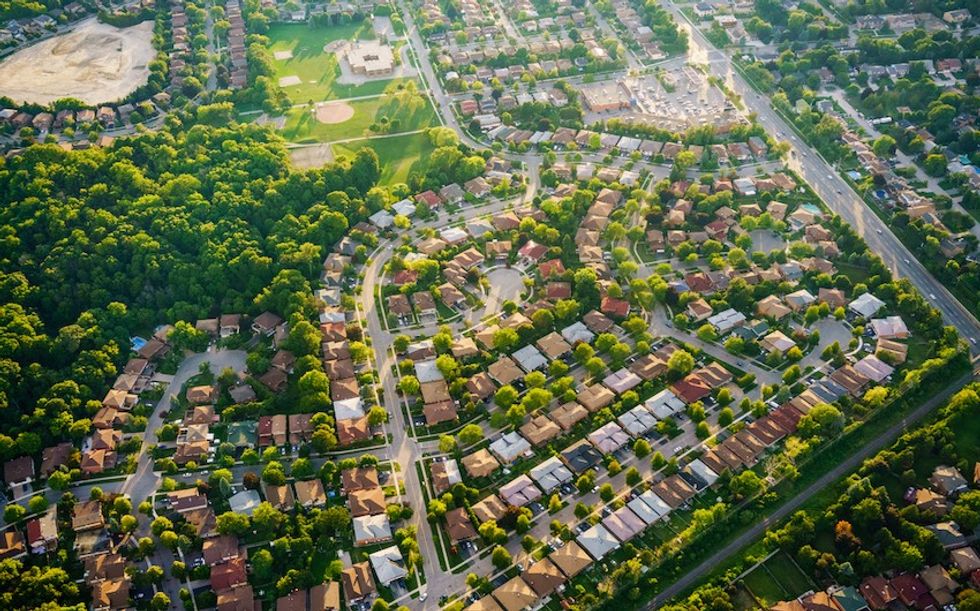In the grips of a global pandemic, the Greater Toronto Area’s (GTA) real estate market for single-family homes grew hotter than ever. Home prices and transactions in the region continue to soar to record-breaking heights.
But how long will it last? Is the GTA housing market rising at an unsustainable pace?
Some have been waving early warning flags that we’re heading in the direction of a boom, followed by a significant bust, once today’s historic-low interest rates (they currently sit at 0.25 per cent) start to rise. While some industry insiders adamantly denounce the probability of a real estate bubble, others point to early signs of an overheating market – especially in the red-hot suburbs.
Senior Economist of RBC Economics Robert Hogue says – though we’re not there right now – the risk of a real estate bubble has increased as the pandemic has played out.
“The sort of dynamics we’re seeing could be the early signs that the market is heating up: much more frantic activity, much more fear of missing out, and accelerating prices,” says Hogue. “That could start to feed on itself, if speculators start to get into the game because they’re making let’s-see opportunities for quick money. But there are certainly some dynamics that are worth monitoring very closely.”
A real estate bubble can occur when housing levels rise up significantly due to demand, speculation, and exuberant spending – all of which we are seeing now among eager (and often desperate) GTA buyers. At some point, however, this can become unsustainable; eventually the demand increases or flat lines, causing a steep drop in prices. At this point, the bubble bursts.

The bursting of Toronto's real estate bubble is something some have been prophesizing for the past 20 years. Many even cheer for its realization. But desire has -- so far -- not equated to destiny.
“In order to figure out the probability of a bubble, we can look at history and the last time we had one, which was in 1989,” says Dana Senagama, a housing market analyst at the Canadian Mortgage and Housing Corporation (CMHC). “There was the condo crash and about 10 years of declining and rock bottom prices. At that time, the most significant aspect was that mortgage rates were in the double digits; they were around 15 per cent and inflation was pretty high, at about 12 per cent.”
Right now, however, notes Senagama, we’re in a very different situation, thanks to ultra-low mortgage rates. “Inflation has been pretty flat as a result of the pandemic, and there are no indications that interest rates are going to increase at any significant amount either,” she says. Historically, once inflation rises, interest rates naturally follow. But Bank of Canada Governor Tiff Macklem has already said he's unlikely to raise the overnight lending rate (the aforementioned 0.25 per cent) until 2023.
Thanks in part to these low interest rates, bidding wars are driving up prices for housing stock both within the city confines and in the surrounding suburbs (and beyond) – often, to jaw-dropping amounts – as former Toronto residents seek to satisfy a pandemic-inspired craving for more space and a reprieve from the city concrete.
According to an analysis of Durham and Halton regions by John Pasalis of Toronto real estate brokerage Realosophy, prices for detached, semi-detached and row houses have seen year-over-year price increases of around 20 per cent.
“There certainly is a bubble in the suburbs, not so much in the downtown core. By any definition, prices are up 30-plus per cent since last year and the average home is up 16 per cent since November in the suburbs,” says Pasalis. “When we think about bubbles, one of the key drivers is a rapid acceleration of housing prices – and they don’t normally appreciate 16 per cent in two months. A lot of this is driven by exuberance in the housing market, leading to bubble-like symptoms in suburbia.”
When it comes down to it, suburban home seekers are prepared to dish out more dollars due to a fear of missing out, as the need for things like a backyard and a home office (or two) becomes glaringly essential.
“In December and January, suburban buyers would be interested in a house and look at what a similar home sold for two weeks ago and think, ‘I have to pay $50,000 more just to get this,’” says Pasalis. “In a normal market, people would think ‘that buyer is irrational; I am not going to keep up with their price.’ If house is worth a million, they’re paying a million.”
But when buyers have the mindset that they need to pay $50,000 or $60,000 more, says Pasalis, it causes this rapid acceleration, where buyers are paying four to six per cent more than what a similar home sold for just weeks prior. But Pasalis predicts this buying frenzy won’t last.
RELATED: Average Price of GTA Homes Officially Eclipses $1M Mark in February
“What we’re starting to see now is that is slowing down,” he says. “People are paying closer to what the comparable sales may be – which are still significantly higher than they were three months ago – but they’re not pushing them up rapidly. We’ll probably see prices stabilize in the months ahead.”
As Ron Butler of Butler Mortgage highlights, one thing to consider when it comes to a climate of homes that sell for hundreds of thousands of dollars above asking is the role of down payments and mortgage costs. “It doesn’t matter how much you pay for the house if the mortgage isn’t large,” says Butler. “We look at these prices of houses accelerating greatly and we assume that they’re all highly mortgaged. Some of them are – some of them definitely are. But some of them aren’t.”
Butler doesn't think that an influx of mortgage delinquencies is in the cards any time soon.
“People like to assume that because housing prices have gone up and the number of mortgages has grown – there’s more mortgages then there ever have been in Canada – that this could indicate that if the values fall and people chose not to pay their mortgage, it could be a problem for the banks. But right now today, that is not the situation." Stressing how extensively mortgages are underwritten, Butler doesn't see this happening.
Toronto real estate agent Scott Shallow remains unconvinced about the probability of a real estate bubble or that home prices will cool any time soon. “I’ve been hearing about this real estate bubble since 2003, and the fact that it’s going to burst – people get really animated about it,” says Shallow. “There has to be an economic factor that changes something drastically – it’s not just going to blow up.”
He points to 2008 and 2009 – “the greatest financial meltdown since the Great Depression,” he says – when prices fell off 5 per cent from October 2008 to February 2009. “Then, the market went nuts again because they lowered interest rates,” says Shallow. “Now, we’re in the middle of a pandemic and a lockdown and the market is on fire.”
It all comes down to a relentless and lasting lack of supply and no shortage of wealth, he says.
“There’s a fundamental problem with the way Toronto is designed in the first place. Toronto was never designed to be a big financial city; it used to be an agricultural town centred on things like the Royal Winter Fair and slaughterhouses,” says Shallow. “We built single-family homes throughout downtown Toronto, but there shouldn’t be single-family homes in the downtown core – from about Don Valley all the way across to the Humber River, we shouldn’t see houses.”
The Toronto housing market, says Shallow, is chronically under supply (something that comes as no surprise to today's house hunters). “It’s not like we’re ever going to have 5000 homes for sale in the core of the city; it isn’t going to happen,” he says. “We’ll always have an undersupply. We can’t build any more, and that’s the challenge.”
While anyone who's browsed condo sites in recent months would argue that there is definitely no shortage of supply on the condo front, where prices were trending in the opposite direction of single-family homes until recently, the reality is that Toronto will one day return to shine again, perhaps brighter than it did pre-pandemic. And so will its appeal as a place to live. The Toronto condo market will bounce back, experts agree.

The GTA is growing and will continue to grow at an enormous rate. “The federal government will open up an influx of immigrants to Canada, which is great for the country, but also puts pressure on the housing market,” says Shallow. “Three hundred thousand of those new residents are going to be in the GTA. We can’t keep up and we’re running out of land.”
The demand will outstrip supply, says Shallow – and there will always be a buyer with deep enough pockets waiting in line. He and Senagama point to the impact of generational wealth – recognizing the increasing unattainability of GTA home ownership, the Baby Boomers are helping their kids out with down payments – and an influx of money from around the world.
READ: Nearly a Quarter of Millennials Expect $100K from Family to Be Able to Purchase a Home
“Home prices may have quadrupled, but this is supported by strong population growth facilitated by immigration numbers, and employment growth,” agrees Senagama. “The ones who have suffered most financially from the pandemic are the ones in service, not necessarily the ones who are going to be buying GTA homes. Many households were actually able to save money during the pandemic and haven’t been negatively impacted.”
While Senagama acknowledges that buyers are taking on more debt in theory, she says data is not currently available in terms of the wealth someone could be bring into the purchase from an inheritance or family support.
“Are we seeing more financial delinquency? No. This is telling us that people are taking on more debt but at the same time arrear rates and delinquency rates remaining low tells us that people are able to manage their obligations,” she says.
So, we aren’t in a bubble, says Senagama.
“But we can’t completely relax and assume this is the way the market is going to flow. The longer the pandemic goes on, we’ll start to see the larger impact of the job losses, not just in the service and hospitality but it will ultimately make its way to other areas of employment as well – that’s the big if…when do we get out of this?”
The obvious hope is that mass vaccination and subsequent revival of Toronto will come sooner than later. In the meantime, the GTA real estate market shows little sign of cooling.
“I think real estate prices are going to go up 20 percent before they fall flat,” says Shallow. “You have to look at what causes a bubble; over speculation leading to over supply. We don’t build based on speculation in Canada like they do in the U.S. We are going to be chronically under supply for single-family homes; we simply won’t have enough homes within a reasonable commute to Toronto.”
In terms of the hot suburban housing supply, Pasalis predicts it will pick up as we head into the spring, when it naturally does. “Is it going to be enough to fill the demand in the suburbs? Probably not,” he says. “There’s so much demand and so much competition. In April and May we will see some heat come off the market. Houses that were getting 20 offers may now get 10 or 5. It shouldn’t be as competitive.”
But it will remain healthy – and pricey.
“It’s hard to see how prices can really top up at this point, the market is so incredibly tight,” says RBC's Hogue. “I think affordability will start cooling demand maybe a few months from now or later this year, but right now, the only thing holding back the market is lack of supply. There’s a ton of buyers out there.”
Hogue says spring will be a good test to determine wether new sellers emerge. “If not, we’re likely to see prices continue to rise, because that’s your clearing mechanism. You need to clear out buyers, and prices will do it,” said Hogue.
Not surprisingly, the general consensus is that a substantial increase in interest rates would have to occur for a bubble. Last week, Bank of Canada Governor Tiff Macklem addressed the risk that “housing prices could get stretched and households could get stretched” with record-low interest rates. However, he reiterated there is currently no plan to raise interest rates until 2023, when the post-pandemic economy is in better shape.
So, while the GTA may be experiencing bubble-like symptoms, the odds of a dramatic burst seems unlikely -- though definitely not impossible -- especially when the lifeblood and "business as usual(ish)" returns to the region post-pandemic.






















